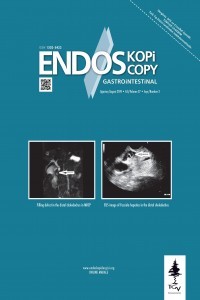Pediatrik hastalarda kronik pankreatit ve endoskopik ultrasonografi arasındaki ilişkinin değerlendirilmesi
çocuk, Endoskopik ultrosonografi
Evaluation of the relationship between chronic pancreatitis and endoscopic ultrasonography in pediatric patients
Child, Endoscopic ultrasonography,
___
- References 1. Cheryl E Gariepy, Melvin B. Heyman, Mark E. Lowe et al. The Causal Evaluation of Acute Recurrent and Chronic Pancreatitis in Children: Consensus From the INSPPIRE Group. J Pediatr Gastroenterol Nutr 2017; 64: 95–103. 2. Adzick NS. The pancreas. In: Coran AG, Adzick NS, T.M K, et al.,eds. Pediatric Surgery 2012;1371–1384 3. Darge K, Anupindi S. Pancreatitis and the role of US, MRCP and ERCP. Pediatr Radiol 2009; 39:153-157. 4. Sivak MV, Kaufman A. Endoscopic ultrasonography in the differential diagnosis of pancreatic disease. A preliminary report. Scand J Gastroenterol Suppl 1986; 39: 153-7 5. Stevens T. Update on the role of endoscopic ultrasound in chronic pancreatitis. Curr Gastroenterol Rep 2011; 13: 117–122. 6. Seicean A. Endoscopic ultrasound in chronic pancreatitis: where are we now? World J Gastroenterol 2010; 16: 4253–4263. 7. Wiersema MJ, Hawes RH, Lehman GA, Kochman ML, Sherman S, Kopecky KK. Prospective evaluation of endoscopic ultrasonography and endoscopic retrograde cholangiopancreatography in patients with chronic abdominal pain of suspected pancreatic origin. Endoscopy 1993: 25: 555–564. 8. Buscail L, Escourrou J, Moreau J, et al. Endoscopic ultrasonography in chronic pancreatitis: a comparative prospective study with conventional ultrasonography, computed tomography, and ERCP. Pancreas 1995; 10: 215–217. 9. Sahai AV, Zimmerman M, Aabakken L, et al. Prospective assessment of the ability of endoscopic ultrasound to diagnose, exclude, or establish the severity of chronic pancreatitis found by endoscopic retrograde cholangiopancreatography. Gastrointest Endosc1998; 48: 18–25. 10. Catalano MF, Lahotu S, Geenen JE Hogan WJ. Prospective evaluation of endoscopic ultrasonography, endoscopic retrograde pancreatography, and secretin test in the diagnosis of chronic pancreatitis. Gastrointest Endosc 1998; 48: 11–17. 11. Kahl S, Glasbrenner B, Leodolter A, Pross M, Schulz HU, Malfertheiner P. EUS in the diagnosis of early chronic pancreatitis: a prospective follow-up study. Gastrointest Endosc 2002; 55: 507–511. 12. Rickes S, Uhle C, Kahl S, et al. Echo enhanced ultrasound: a new valid initial imaging approach for severe acute pancreatitis. Gut 2006; 55:74–78. 13. Varadarajulu S, Wilcox CM, Eloubeidi MA. Impact of eus in the evaluation of pancreaticobiliary disorders in children. Gastrointest Endosc2005; 62: 239-244. 14. Gordon K, Conway J, Evans J, Petty J, Fortunato JE, Mishra G. Eus and Eus-guided interventions alter clinical management in children with digestive diseases. J Pediatr Gastroenterol Nutr 2016; 63: 242-2466. 15. Morinville VD, Husain SZ, Bai H, et al. Definitions of pediatric pancreatitis and survey of present clinical practices. J Pediatr Gastroenterol Nutr 2012; 55:261. 16. Kalmin B, Hoffman B, Hawes R, Romagnuolo J. Conventional versus Rosemont endoscopic ultrasound criteria for chronic pancreatitis: comparing interobserver reliability and intertest agreement. Can J Gastroenterol 2011;25:261-4 17. Catalano MF, Sahai A, Levy M, et al. EUS-based criteria for the diagnosis of chronic pancreatitis: the Rosemont classification. Gastrointest Endosc 2009; 69: 1251-61. 18. A Parniczky A Maisam Haija A-E, Husain S, et al. EPC/HPSG evidence-based guidelines for the management of pediatric Pancreatitis. Pancreatology 2018; 18:146-160. 19. Gardner TB, Levy MJ. EUS diagnosis of chronic pancreatitis. Gastrointest Endosc 2010;71:1280–1289 20. Morris-Stiff G, Webster P, Frost B, Lewis WG, Puntis MC, Roberts SA Endoscopic ultrasound reliably identifies chronic pancreatitis when other imaging modalities have been non -diagnostic. JOP 2009; 10:280–283. 21. Singh SK, Srivastava A, Rai P, Yachha SK, Poddar U. Yield of Endoscopic Ultrasound in Children and Adolescent With Acute Recurrent Pancreatitis. J Pediatr Gastroenterol Nutr 2018; 66: 461-465. 22. Scheers I, Ergun M, Aouattah T, et al. Diagnostic and Therapeutic Roles of Endoscopic Ultrasound in Pediatric Pancreaticobiliary Disorders. J Pediatr Gastroenterol Nutr 2015; 61:238–247
- ISSN: 1302-5422
- Başlangıç: 2010
- Yayıncı: Türk Gastroenteroloji Vakfı
Kolorektal premalign polipler ile mide premalign lezyonları arasındaki ilişki
Harun ERDAL, Armağan GÜNAL, Bülent ÇELİK, Yusuf SAKİN, Cemal ERÇİN, Ahmet UYGUN, Mustafa GÜLŞEN
Cerrahi için yüksek riskli bir hastada akut kolesistitin endoskopik transpapiller drenajı
Sinem İPOR, Mehmet ÇETİN, Atilla ÖNMEZ, Alper İPOR, Serkan TORUN
Muş bölgesindeki üst gastrointestinal sistem malignitelerinin özellikleri
Nazointestinal tüp yerleştirilmesi ve sonuçları
Ferda HARMANDAR, İsmail GÖMCELİ, Ayhan ÇEKİN, Orbay HARMANDAR, Feyzi BOSTAN
Malign biliyer darlıkta endoskopik ultrasonografi eşliğinde biliyer drenaj: Olgu sunumu
Nuretdin SUNA, Diğdem ETİK, Nomingerel TSEVELDORJ, Fatih HİLMİOĞLU
Kolorektal kanser tanı ve tedavisinde önemli bir problem: Obstrüksiyon
Fatma DEMİRBAŞ, Mustafa KAYMAZLI, Gönül DİNLER ÇALTEPE, Esra EREN, Ayhan Gazi KALAYCI, Ahmet BEKTAŞ
Evre 2 kolon tümörlerinde klinikopatolojik faktörlerin sağkalımla ilişkisi
